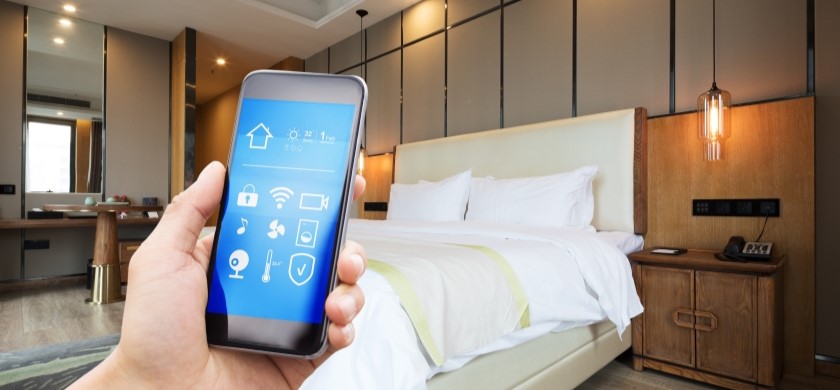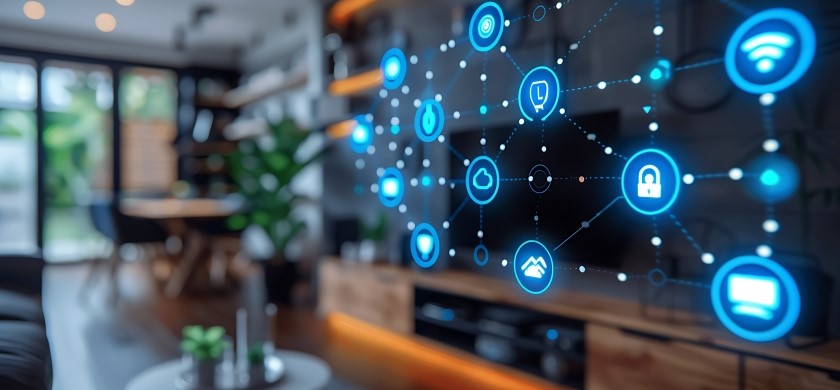Transformative Smart Room Technology Across Your Hotel Guest Rooms
Travelers today expect more than just a comfortable bed and clean room; they’re craving unique, cutting-edge experiences that blend convenience, personalization, and a touch of luxury. One of the most exciting innovations reshaping the guest experience is the rise of smart rooms — hotel rooms enhanced with integrated technology designed to make stays more intuitive, efficient, and memorable.
From voice-activated controls to automated lighting, temperature settings, and seamless connectivity, smart room technology is quickly becoming a sought-after amenity. But how do hotels actually bring these features to life?
To help you navigate this transformation, we’ve compiled a list of the most effective and engaging ways to implement smart room features along with the technology each solution requires to deliver a next-level guest experience.
- What is IoT Integration in Hotels?
- Seven Cutting-Edge Smart Room Ideas for Hotels
- Turn a Hotel Room Into a Smart Room With Hospitality Network Internet Connectivity
What is IoT Integration in Hotel Rooms?
IoT integration in hotel rooms refers to the seamless connection of smart devices, sensors, and systems throughout the property, all communicating through a central network. Short for the Internet of Things, IoT technology enables devices in guest rooms — from thermostats and light fixtures to TVs and door locks — to connect to the internet and respond to user inputs in real time.

Seven Cutting-Edge Smart Room Technology Ideas for Hotels
Implementing smart room technology isn’t just about adding flashy gadgets. It creates a more intuitive, personalized, and comfortable guest experience. From energy-saving automation to mobile-controlled lighting and entertainment, today’s most innovative hotels are using IoT to turn ordinary rooms into connected, guest-first environments. Below are seven hotel technology trends that show how your property can bring the future of hospitality into every stay.
Intuitive Adjustments to Room Conditions
Traditional hotels have decentralized control over room environments; changes to temperature, lighting, and other conditions are accessible via separate devices, forcing guests to locate and operate multiple unique, often confusing interfaces.
Leveraging mobile apps, smart rooms offer responsive hubs for controlling room conditions. Smart room mobile apps let guests adjust diverse portions of their room experience, including:
- Thermostats, adjusting temperatures through both heating and cooling.
- Lighting, from on/off switches to adjustable dimmers.
- Curtain adjustments, letting in or excluding natural light at the push of a button.
These controls add unprecedented accessibility to hotel rooms. Any guest can personally customize their room, without having to move around or operate an unfamiliar device. As such, smart room control apps save guests time, hassle, and discomfort.
Smart Room Mood Lighting
Beyond allowing access to turning the lights on and off through mobile apps, smart hotel rooms can also employ holistic, customizable mood lighting capabilities. IoT-connected smart bulbs in guest rooms can:
- Change brightness coordinated specific times of the day.
- Adapt to specific colors, from deep reds to bright blues.
- React to music as it plays from speakers or hotel room televisions.
All of these features give guests exciting new ways to enjoy lighting beyond the banal, iridescent lighting typically associated with hotels.
Controlling In-Room Entertainment
As the entertainment industry evolves, so do guest expectations for In-Room Entertainment. Modern travelers already have access to diverse entertainment options at home. Additionally, these entertainment options are all watchable and controllable from multiple devices. Hotels need to match this level of connectivity in order to satisfy guests.
In smart rooms, guests can access their content with ease. Using casting technology, travelers can connect their streaming accounts to hotel televisions through their own devices, eliminating the hassle of logging on again. Smart room casting lets guests watch whatever content they please, whether streamed or downloaded.
Similar to innovations in room conditions, smart rooms also allow guests to control their In-Room Entertainment using smartphone applications. Guests in smart rooms can turn their TV on and off, change the channel, and control streaming services such as Netflix and Hulu.
Streamlined Interaction with Guest Services
Smart rooms also simplify communication with guest services. Whereas visitors would typically have to call guest services through a hotel phone, smart rooms shorten the process with communication via designated, intuitive applications.
Smart rooms can even advertise amenities to guests. Modern In-Room Entertainment packages can showcase advertisements for hotel features, including for:
- Spa services
- Exercise classes
- Room service for food, drink, and other amenities
- Restaurant reservations
Advertisements within in-room entertainment platforms can also offer exclusive upsells unseen in other areas of your property, rewarding guests for leveraging their smart room technology.

Interactive Hotel Mapping
Televisions in smart rooms offer additional convenience to guests by serving as a hub for digital wayfinding. Upload interactive hotel information to In-Room Entertainment consoles that allow guests to explore your hotel’s features via their TV remote or smartphone.
Hotels can also combine wayfinding with turnkey advertising and booking for a holistic hotel exploration experience. As guests approach virtual storefronts, they can access instant booking for that location. Once integrated, this technology lets guests know how, when, and where to get the amenities they crave.
Sustainability Through Automation
Beyond guest convenience, smart rooms provide extensive capabilities for sustainability. Automation in smart rooms helps to both cut down on hotel operating costs and benefit the environment.
Monitors in Smart Rooms can detect when a guest leaves their room and adapt room conditions accordingly. In turn, sustainability automation can:
-
- Dim or turn off lights when guests leave the room, detecting low movement or guest exits.
- Adjust thermostat settings to save energy in unused rooms.
- Detect shower and faucet leaks, conserving water and streamlining maintenance.
With automation in place, hotels ensure they don’t waste valuable electricity, water, or additional utilities on rooms that don’t need them.
Network Device Isolation
As hotels adopt more connected devices and IoT-driven services, guest privacy and digital security become increasingly important. One essential safeguard is network device isolation, a behind-the-scenes technology that ensures devices on the same WiFi network cannot communicate with one another. This simple yet powerful layer of protection prevents guests from accidentally (or intentionally) accessing each other’s files, streaming devices, or personal information — especially within complex smart room infrastructure.
Turn a Hotel Room Into a Smart Room With Hospitality Network Internet Connectivity
IoT powered smart rooms are the next evolution of smart, comfortable guest experiences. All of these trends offer exciting new experiences for guests and substantial opportunities for hoteliers to raise their revenue. To implement any of these trends, however, hotels need a capable WiFi network to maintain smart functionality.
Hospitality Network is a leading provider of Hospitality IoT Technology. Our solutions offer reliable network connectivity to hotels, perfect for supporting and maintaining smart rooms. Request a consultation today and begin laying the foundation for even greater guest experiences within your hotel.

